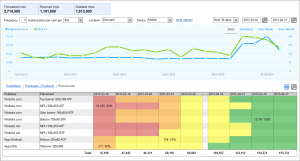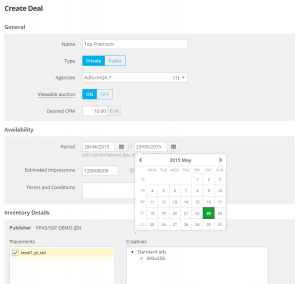'We Saw a Need to Give Control Back to Publishers'
by on 27th Apr 2015 in News


Denmark-based Adform has established itself as one of the leading European ad tech firms on the market, with the company today (27 April) announcing the launch of its Programmatic Publisher Ad Server (PPAS), the first solution in its planned Publisher Edge Solution suite. ExchangeWire caught up with Martin Stockfleth Larsen, Adform, CMO, and regular ExchangeWire contributor, to learn more about the outfit's latest offering.
Adform has announced the launch of a new ad server for publishers – PPAS – claiming the latest addition to its ad stack will help publishers maximise yield, increase sell-through rates, plus reduce potential pain-points when employing operating multiple models of selling media programmatically – such as one model cannibalising potential gains elsewhere in a media outfit's operation. In addition Adform claims PPAS offers publishers an "innovative option" to leverage inventory, traditional sales workflow and programmatic channels.
Discussing the launch, Gustav Mellentin, Adform CEO, said: “Many publishers have been slow to adopt programmatic strategies because of the perceived threat they pose to existing, high value direct sales channels.
"We created the PPAS to address these concerns and provide a solution for publishers who want to maintain a direct sales channel, while also embracing the power of programmatic. This new solution ensures that publishers maximise yield regardless of whether inventory is sold programmatically or through direct deals.”
PPAS is the first product in Adform’s Publisher Edge solutions suite and is fully integrated with its private marketplace (PMP), data management platform (DMP), plus extensive creative toolset, as well as its soon to be launched SSP, see (gallery below for images).
- Snapshot of Adform’s PPAS
- Snapshot of Adform’s PPAS
The company has a steady stream of new products planned for release throughout 2015, and PPAS comes as the company pursues its rapid expansion across the globe (Ciaran O'Kane, ExchangeWire, CEO, has tipped the outfit as an attractive purchase option in the ongoing consolidation of the ad tech sector).
Below Adform's Stockfleth Larsen discusses how Adform's PPAS fits into the milieu of solutions pitched towards publishers, including how it latest offering complements its buy-side offering.
 EW: Why did Adform see the need to launch a publisher ad server?
EW: Why did Adform see the need to launch a publisher ad server?
MLS: Two-and-a-half years ago, we started to develop technology for the supply-side and people started asking for a bit more premium inventory, with many saying what they see on a lot of the SSP's and open exchanges was not that great. So we thought: maybe we should do something together? So we then decided to launch the Adform Private Marketplace (PMP), which is essentially an SSP that is not available on the open exchanges, and only available through our own demand-side platform (DSP).
Down the years we have started to add to that, such as a few months ago we launched 'guaranteed viewability'. Having technology on both sides [i.e. both DSP and SSP-like tools] we can develop technology which is exclusively available in our 'own garden' – you could say.
Based on that, as we built the private marketplace (PMP) control, etc, we got more-and-more into the publishers' side. As you know it's the publishers out there that are really struggling [in terms of the emergence of programmatic], while there has been a great number of tools made available to the agencies and advertisers in the past five years, but on the publisher side there have been only a few SSP's, but with the ad server, which effectively is their sales system, not a lot has happened.
Various ad serving vendors have tried to go from being an ad server to having a programmatic offering, to varying degrees of success, and now you are starting to see people like Rubicon Project and Pubmatic going from just a programmatic offering, to a more universal one. Google and DoubelClick has thus far been the only player to have a full-stack offering on the supply-side – to some extent at least – but going for that is feeding your biggest competitor (if you are a publisher that is).
So we saw the need for a platform that can give control, ownership and transparency to publishers. So we decided that it was an opportunity to be a media-agnostic, independent partner that could help solve issues that publishers face when trying to compete with the big guys like Facebook and Google, which have their own fantastic walled garden platforms.
EW: What is different about Adform's solution when it comes to bringing a unique offering to market? Why is it worthwhile to opt for this, as opposed to taking the 'best' of multiple different solutions?
MLS: Many publishers have many different challenges, because they have to manage so many different solutions. They have an ad server, as well as potentially both a PMP plus an SSP, and maybe in some cases a DMP? Some also want to do some rich media, and then they'll have to start working with another vendor than that. So all-in-all that's a lot of different point solutions for them to work with.
When you build all that up into a single sales management solution you have to use what's called 'waterfall models', where you set a number of priorities such as a direct deal, or guaranteed deal, and then you go down the waterfall. And every time you you go down the waterslide, and you go from one platform to the other, you lose money, as you have to pay money to the ad server for doing the pass-back, and doing the calls, etc.
On top of this, you also have discrepancies [between the reporting of the different vendors], and the more people you have on the waterfall, the more discrepancy you will have. This means the publisher will have a lot of management to perform, and it will lose out of money in return for nothing.
So we thought that publishers need a solution where they don't need to worry about waterfalls, guaranteed, or unguaranteed solutions. All they need is one platform to decide what makes sense in a certain case. For instance, if you have a bid from an open exchange that's higher than an amount offered by a guaranteed deal, you should give that impression to the higher bid, not just give everything to your guaranteed deals before going in to the programmatic space. We call this intelligence layer for perfect priority.
EW: You've mentioned some of the large US vendors above, what makes Adform's approach different?
MLS: We're a European company, and have been building technology for over 13 years in the market, so are able to understand the unique local challenges of each one. Each market has its own unique approach to offer inventory, as well as formats. Some will have special data that they want to monetise either directly or through part of a package. From our experience of offering to the demand-side as well, we believe that you need to be local and understand the publishers business to help them drive substantial business. So we're in all the big European markets as well as some of the smaller ones.
Also, as a DSP, we can offer synergies to both sides. Our platform can enable you to do bespoke integrations with ad units that you might not find anywhere else at scale. For instance, with our brand-friendly marketplace, which we launched earlier this year, we can execute whatever creative format we can invent programmatically, as long as you use our platform on the supply-side, as well as the DSP.
That brings benefits to both the demand-side and the supply-side, as you can trade more efficiently, work more efficiently, and improve yield for the publisher, plus the demand-side can get some scale with ad units that are a bit more for fun than just the standard formats that were just used for DR [direct response] campaigns.
EW: The publisher co-op model has received a lot of attention recently due to the emergence of two high-profile offerings. How do you see your company's offering as complementary, or indeed preferable, to selling media in such a fashion?
MLS: When you get a lot of publishers that come together and choose a programmatic offering, and choose to partner with an AppNexus or Rubicon Project, they still have to partner with independent ad servers, or DMP's, etc, in which case they could use the Adform solution. Alternatively, if they want to look for an alternative outside of the programmatic real-time bidding (RTB), they can use Adform for the standard for automated guaranteed, etc.
EW: Have publishers have signed up to PPAS?
MLS: PPAS has been in private beta for a few months now, and we have signed up one of the largest publishers in the Nordics to use the platform, and we have a handful of clients that have also used it in private beta.
Ad ServerAdvertiserDataDigital MarketingDisplayDMPDSPEMEAExchangeMeasurementMedia SpendMiddle EastMobileNordicsProgrammaticPublisherRegulationSSPTargetingTechnologyTradingTrading Desk










Follow ExchangeWire